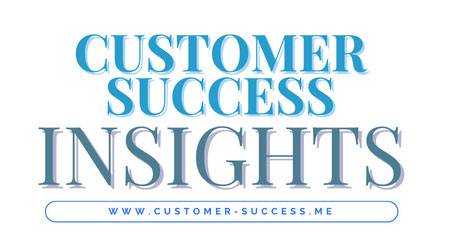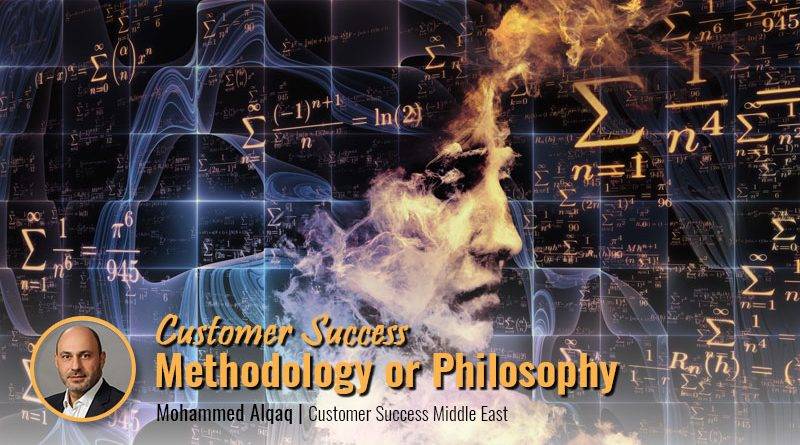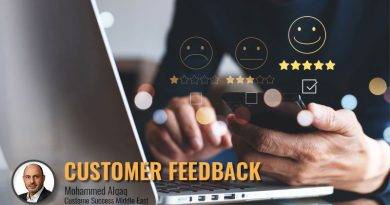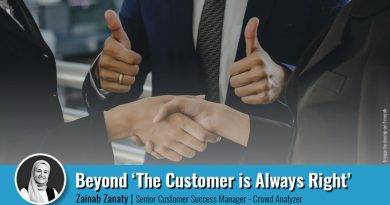Customer Success – Methodology or Philosophy
Customer Success : Methodology or Philosophy
By: Mohammed Alqaq
Customer Success (CS) is a business strategy that aims to maximize customer value and foster deep, long-term relationships with customers. It revolves around understanding customer needs, delivering solutions that meet those needs, and continually enhancing customer experience to drive loyalty and growth.
But is Customer Success a methodology or a philosophy? Before we delve into this question, let’s define what we mean by methodology and philosophy.
Methodology refers to a system of methods used in a particular area of study or activity. It is a structured approach to solving problems or achieving objectives, often characterized by specific steps, tools, and techniques.
On the other hand, philosophy is more of a belief or way of thinking about something. It is not necessarily tied to specific steps or procedures but is more about overarching principles and attitudes that guide behavior.
Methodology
Philosophy
Definition
A system of methods used in a particular area of study or activity.
A belief or way of thinking about something.
Characteristics
Structured approach, Specific steps, tools, and techniques.
Overarching principles and attitudes, Not necessarily tied to specific steps or procedures.
Now, let’s explore whether CS is a methodology or a philosophy.
Table of Contents
Is Customer Success a Methodology?
When viewed as a methodology, Customer Success involves a systematic approach to understanding customer needs, implementing solutions, tracking customer usage and behavior, and proactively addressing issues and opportunities. Customer Success teams often follow specific processes and use tools like Customer Relationship Management (CRM) systems and Customer Success software to manage customer relationships and drive success.
For example, a Customer Success team might follow a methodology that includes steps like onboarding new customers, tracking product usage, conducting regular customer check-ins, identifying upsell and cross-sell opportunities, managing renewals, and conducting exit interviews with churned customers.
"The most effective customer success methodologies are those that are ingrained in the company culture and reflected in every interaction with customers.
Is Customer Success a Philosophy?
From a philosophical perspective, Customer Success is about adopting a customer-centric mindset throughout the organization. It’s not just about specific processes or tools, but an overarching belief that the company’s success is intimately tied to the success of its customers.
For instance, a company that views Customer Success as a philosophy might focus on cultivating a deep understanding of customer needs and challenges across all departments, not just the Customer Success team. It might prioritize customer feedback in product development, involve Customer Success considerations in strategic decision-making, and cultivate a company culture that celebrates customer success.
“Together, they ensure that companies are not just doing things right (methodology) but also doing the right things (philosophy).”
In reality, Customer Success is both a methodology and a philosophy. It involves specific processes and tools (methodology), but it also requires an overarching, company-wide commitment to customer-centricity (philosophy). To truly drive Customer Success, companies need to combine systematic, data-driven approaches with a genuine commitment to understanding and serving customer needs.
Philosophy Empowers Methodology
Building a Customer Success philosophy that empowers the methodology involves creating a company culture that emphasizes customer-centricity at all levels. Here’s how a company can do this:
Leadership Commitment: Leaders should model the importance of customer success by prioritizing it in their own actions and decisions. They can do this by regularly discussing customer success in meetings, setting customer-centric goals, and recognizing employees who go above and beyond to deliver customer value.
Cross-Functional Collaboration: Customer success is not just the responsibility of the Customer Success team. All departments, from sales and marketing to product development and customer support, should understand and contribute to customer success. This could involve regular cross-functional meetings to discuss customer feedback, joint initiatives to improve customer experience, and shared metrics that reflect the company’s customer success goals.
Training and Development: Companies can provide training and development opportunities to equip all employees with the skills and knowledge they need to contribute to customer success. This could include workshops on customer empathy, courses on using customer success software, or training sessions on problem-solving and communication skills.
Customer Feedback: Companies should regularly gather and act on customer feedback to continuously improve their products and services. This feedback can be collected through surveys, interviews, or customer usage data. It’s important that this feedback is shared across the company and used to inform decision-making and drive improvements.
By building a strong Customer Success philosophy, companies can ensure that their Customer Success methodology is not just a set of processes, but a way of thinking and acting that permeates the entire organization. This can empower the methodology, making it more effective at driving customer value and fostering long-term customer relationships.
Building a Methodology that Reflects Company Philosophy
Define Clear Objectives: The first step in building a customer success methodology is defining clear, measurable objectives that align with the company’s customer-centric philosophy. These objectives could be related to customer retention, satisfaction, product usage, or upselling and cross-selling.
Develop a Customer Journey Map: A customer journey map outlines all the touchpoints a customer has with your company. It helps in understanding and anticipating customer needs and experiences at each stage of the customer lifecycle.
Establish Proactive Communication: Regular and proactive communication with customers is key. This can be through regular check-ins, surveys, or automated messages based on customer behavior.
Implement a Robust CRM System: A good Customer Relationship Management (CRM) system can help track customer interactions, identify trends, and provide data-driven insights that inform your customer success strategy.
Measure Success and Iterate: Use specific, measurable metrics to evaluate the success of your customer success efforts. Regularly reviewing and refining your methodology based on these metrics will ensure it remains effective and aligned with your customer-centric philosophy.
Invest in Training: Make sure that everyone in your organization understands your customer success methodology and how it reflects the company’s commitment to customer centricity. Provide regular training and resources to help your team effectively implement this methodology.
Foster a Customer-Centric Culture: Align every department and function in your organization with your customer success philosophy. From product development to sales and marketing, every department should understand and contribute to customer success.
Remember, the most effective customer success methodologies are those that are ingrained in the company culture and reflected in every interaction with customers.
Doing things right by doing the right things
The duality of Customer Success as both a methodology and a philosophy is what lends it its potency. As a methodology, it provides a structured, systematic approach that facilitates the practical implementation of strategies. It provides a framework that can be followed, with defined processes, steps, and tools that can be used to drive customer success. This allows for consistency, measurement, and continuous improvement.
As a philosophy, it inculcates a mindset that places the customer at the heart of everything the company does. It’s about cultivating an organization-wide culture that values and prioritizes customer success. It ensures that every department, every role, every decision is guided by the goal of maximizing customer value and fostering long-term, mutually beneficial relationships.
The true power of Customer Success lies in the integration of both these aspects. The methodology provides the ‘how’, the tangible actions that need to be taken. The philosophy provides the ‘why’, the purpose that drives these actions. Together, they ensure that companies are not just doing things right (methodology) but also doing the right things (philosophy).
Companies looking to fully leverage the potential of Customer Success need to ensure that they not only have robust processes and tools in place but also foster a customer-centric culture that permeates across all levels and functions. They need to focus on both the science (data-driven strategies, metrics, analytics) and the art (relationships, experiences, empathy) of Customer Success.
Implementing this balanced approach can help companies achieve higher customer retention rates, improve customer loyalty, drive growth and profitability, and build a sustainable competitive advantage in today’s customer-driven market landscape.
Author

Mohammed Alqaq
The Founder of Customer Success Middle East. Mohammed has been instrumental in helping professionals realize value and achieve their desired outcomes through an extraordinary success journey. Throughout his 18-year journey in customer-facing roles, Mohammed has had the privilege of managing international teams and fostering exceptional relationships with customers worldwide. In 2023, he was recognized as one of the ‘Top 100 Customer Success Strategists,’ and was nominated as one of the ‘Most Creative Customer Success Leaders in 2023 & 2024.’ These recognition's represent not only personal milestones but also a testament to his dedication to redefining customer success. His journey in this field is not just about achieving results, but also about creating meaningful, long-lasting experiences that drive business growth.

Stay ahead of the game.
Sign up to the newsletter.
Get all the hottest customer success conversations and talking points landing in your inbox once a month, every month.




